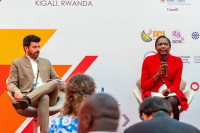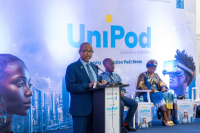Fintech solutions are multiplying across the continent to address various financial service issues. In Togo, a startup has focused on mobile money interoperability and offers a solution in this regard.
eGo Transfer, a fintech solution developed by a startup in Togo, enables users to send and receive money via mobile, irrespective of their telecom provider. The startup, headquartered in Lomé, was established in 2020 by Attisso Luz Koumedzro.
"The inspiration for eGo Transfer came when my younger brother asked me to send him money via Flooz, but I was using T-Money. So, I conceived eGo Transfer, which facilitates money transfers from T-Money to Flooz and vice versa. It also allows for money received from Ria to be deposited into T-Money or Flooz accounts," Koumedzro explained.
The solution includes a mobile app for Android smartphones, which can be downloaded from the eGo Transfer website, although it is not available on the Play Store. After downloading, users create an account by providing details such as their first and last names, phone number, and a six-digit PIN code.
Once the account is set up, users can transfer funds to any telecom network operating in Togo. Within the app's interface, users simply select the network they want to transfer from and to, enter the amount, phone number, and PIN code to confirm the transfer. Transfers via this mobile app require a minimum of 300 CFA francs (approximately $0.49).
In 2020, eGo Transfer won the first prize at the Open Hack organized by the Nunya Lab incubator. The aim was to propose an innovative solution, and eGo Transfer captured the jury's attention, walking away with a check for one million CFA francs. In 2023, the fintech, along with seven other Togolese startups, was selected to participate in the Tech Africa-Europe International Summit, Emerging Valley, held on November 27-28 in Marseille, France.
Adoni Conrad Quenum
A robotics and artificial intelligence expert, he's made a name for himself by designing drones and AI solutions. Now, he's a major player in both continental and global technological advancements.
William Elong (photo) is a Cameroonian entrepreneur and business leader. As the founder and CEO of Faraday, he applies his expertise and knowledge in artificial intelligence to serve everyone, developing open-source AI and cybersecurity solutions.
Faraday, a startup based in France and Belgium, specializes in AI, fintech, and cybersecurity solutions. Its flagship product, Ares Chat, is a collaborative platform that allows users to share files, communicate with their team, and interact with AI within a secure ecosystem.
Faraday's solution offers a unique ecosystem that includes a browser, a chat model connected to the user's banking services, and a web search feature. Another product from the startup, Ares Creative, enables image generation to stimulate users' creativity.
In addition to Faraday, William Elong has been the founder and CEO of Will & Brothers Consulting since 2014, providing IT innovation and consulting services worldwide. In 2018, he founded Algo Drone Holding, focused on developing drone and AI solutions, where he also serves as CEO.
As a serial entrepreneur, he founded Cameroon Flying Lab in 2018. Affiliated with We Robotics Organization, the Cameroon Flying Lab is an initiative promoting drones, robotics, and STEM (science, technology, engineering, and mathematics) for youth empowerment.
In 2019, William also established the Developers Institute Center, a training center for young developers in Cameroon. He holds a master's degree in Strategy and Competitive Intelligence from the School of Economic Warfare in France, obtained in 2013. Before embarking on entrepreneurship, he gained experience working in various companies.
He worked for Thales Information Systems as an IT specialist and IT project manager from 2011 to 2012. Between 2013 and 2014, he was a sales engineer at Oracle.
Recognized for his achievements, William Elong was ranked among Forbes Africa's 30 Most Promising Young Entrepreneurs Under 30 in 2016.
Melchior Koba
Healthtech is one of the most sought-after segments in the tech sector. Solutions are emerging from all corners to simplify daily life for African populations.
PharMap, a healthtech solution developed by a Beninese startup, allows users to locate and order medications online in less than ten minutes. The startup, co-founded by Anourah Mazu in 2021, aims to streamline access to high-quality medications in Africa, with a particular focus on Benin.
The startup explains, “In Africa, a patient may have to visit over 15 different pharmacies before finding a needed medication. This often leads to the use of counterfeit drugs, resulting in medical complications, or even worse, fatalities. We’re creating the first system that enables you to locate the nearest pharmacies that stock the medications you need.”
To accomplish its mission, PharMap utilizes a mobile app, available on iOS and Android. The Android app has been downloaded over 10,000 times according to Play Store statistics. It also uses the WhatsApp messaging application. After downloading the mobile app, users need to create an account to access services such as "Trouver un médicament (Find a Medication)" and "Trouver une pharmacie (Find a Pharmacy)."
The “Find a Medication” feature enables users to check the availability and price of a medication at nearby pharmacies based on their location. Users can either type the name of the medication into the search bar or send a photo of the prescription. The “Find a Pharmacy” service helps users locate pharmacies in a specific geographical area or those nearest to their current location.
Users can also order medications directly from pharmacies via the app’s interface, make an online payment, and then pick up their order at the pharmacy. For PharMap’s service via WhatsApp, users simply need to save the healthtech’s number and send their request via message. They will receive a response to their query in less than ten minutes, according to the startup.
Adoni Conrad Quenum
The solution was developed to streamline meal deliveries in Nigerian cities. It notably focuses on secondary cities.
Chowopa, a Nigerian startup, has developed a last-mile delivery solution that allows users to order food from their favorite restaurants and have it delivered straight to their homes or offices. The startup was founded in 2022 by Umebe Anthony and Umoru-Musa Abdullahi and is headquartered in Akure, a city in Ondo State.
The Chowopa solution is accessible through a mobile app, available on both iOS and Android platforms. After installing the app, users can create an account by entering their personal details. Once registered, they can place orders from a variety of partner restaurants listed on the platform.
The app allows users to search for restaurants based on location, type of cuisine, or customer ratings. Users can input a specific location within a city or state in the search bar to find restaurants that cater to that area. They also have the option to select a particular type of cuisine, such as African, fast food, Indian, and more. Customer reviews are available to help users choose between restaurants. After their meal is delivered, Chowopa encourages users to rate the service based on the quality of the food and the speed of delivery. Users can also leave comments to provide feedback on their experience.
Restaurants interested in joining the platform can do so by clicking on the "Sell on Chowopa" button and following the registration process. They will be asked to provide details such as the restaurant's name, the owner's name, email address, and phone number.
Adoni Conrad Quenum
Her goal is to simplify the lives of business leaders in Tanzania. Her dedication has been recognized and celebrated by Forbes Africa.
Tanzanian native Prisca Magori (photo) is the co-founder and CEO of Smart EFD, a startup that empowers businesses and corporations to create tax invoices that adhere to local laws and regulations.
Established in 2022, Smart EFD provides a tech-based solution for generating tax receipts from a variety of devices, including smartphones, laptops, point-of-sale terminals, and desktop computers. These receipts can be verified using QR codes, in line with the regulations of the Tanzania Revenue Authority (TRA).
Smart EFD is a service offered by the Tanzanian firm, Evas Autotravel Company Ltd. The solution was developed by TenTen Inc Ltd, a company that Prisca Magori co-founded in 2021. TenTen Inc Ltd, where Magori served as CEO until 2022, operates in the tourism industry, providing an innovative platform for booking immersive travel experiences with flexible payment options.
The CEO earned her petroleum engineering degree from the China University of Petroleum in 2018. She also holds a master's degree in project management from the University of Dar es Salaam, which she received in 2022.
She started her professional journey as an intern at Shengli Oilfield Services Co. in 2017. The following year, she joined the Engineers Registration Board Tanzania as a junior engineer. In 2019, she took on the role of coordinator for the Construction Sector Skills Council at the Tanzania Private Sector Foundation.
In April 2024, Prisca Magori was recognized on the Forbes Africa 30 Under 30 list, an honor given to young entrepreneurs under 30 who are making significant contributions to the development of the continent.
Melchior Koba
A serial entrepreneur, he is the creator of several technological solutions that particularly assist businesses. His goal is to help companies better manage their activities and increase their profits.
Kenyan entrepreneur Stephen Nyumba (photo) is the co-founder and CEO of PokeaPay, a company that offers a comprehensive customer management and payment processing solution. This platform acts as a payment gateway for East Africa, simplifying financial transactions.
Established in 2020, PokeaPay is dedicated to providing customized and innovative solutions to support its clients’ growth. Besides facilitating payments, it assists businesses in enhancing customer interactions and improving the quality of sales. It also equips them with valuable data for making more informed strategic decisions.
PokeaPay supports its clients throughout every stage, from customer acquisition to payment completion, including conversion and sales. It accepts a variety of payment methods, including VISA, MasterCard, M-Pesa, Airtel Money, and Pokea Wallet.
Stephen Nyumba’s contributions extend beyond PokeaPay. The tech entrepreneur has a wealth of experience in technology. In 2004, he co-founded Intrepid Data Systems, a company that specializes in productivity solutions for businesses. He also established the Local Development Research Institute in 2015, an action-oriented think tank aimed at eradicating poverty, hunger, and inequality in Africa.
In 2010, he co-founded iPay Limited, a startup that offers real-time payment processing and billing services, licensed by the Central Bank of Kenya.
Stephen Nyumba earned his Bachelor’s degree in Information Technology from Jomo Kenyatta University of Agriculture and Technology in 2007. He embarked on his professional career in 2002 as an IT Administrator at Centurion Systems, a center for training and technology transfer.
Melchior Koba
The entry of major e-commerce players into African markets will ignite competition, innovation, and investment in the digital economy, leading to improved online access, job creation, and greater prospects for local businesses. This will play a significant role in fostering digital growth and economic development across the continent.
E-commerce giant, Amazon.com Inc., has launched Amazon.co.za in South Africa, today May 7.
“We are excited to launch Amazon.co.za, along with thousands of independent sellers in South Africa. We provide customers with great value, broad selection including international and local products and a convenient delivery experience," said Managing Director of Amazon Sub-Saharan Africa, Robert Koen, in an Amazon statement.
Following last October’s announcement to expand into the region, the platform offers a wide product range from local and international brands. Customers can access Amazon.co.za via the Amazon Shopping App or browsers, with fast delivery options and 3,000 pickup points.
The launch enables local businesses to reach a wider customer base, featuring South African brands alongside international ones.
Amazon reveals that more than 60% of sales in Amazon’s stores globally are from independent sellers—most of which are small and medium-sized businesses. This underscores the potential for leveraging digital platforms to drive economic growth in Africa and create jobs, as it highlights the significant contribution of independent sellers, primarily small and medium-sized businesses, to overall sales.
By providing opportunities for businesses to thrive on digital platforms, there is the potential to stimulate economic activity, foster entrepreneurship, and generate employment opportunities across the continent.
Hikmatu Bilali
“Every May, we commemorate Africa Month, marking a time when the colours of African heritage and the bright promise of its future are brought to the forefront through vibrant celebrations. This year, we're thrilled to partner with the African Union to amplify these celebrations, inviting the world to #DiscoverMyAfrica through the power of YouTube Shorts,” Google reveals
“The #DiscoverMyAfrica Challenge is part of the African Union’s collaborative effort in driving innovation through strategic partnership with Google, through the Office of the Youth Envoy, Make Africa Digital (MAD) initiative,” an AU release, dated May 2, states.
This initiative celebrates Africa's diversity and heritage, empowering youth to share their stories globally. The challenge covers various aspects of African life, including music, art, food, fashion, and landmarks.
Hikmatu Bilali
Information and Communication Technologies (ICTs) offer a powerful engine for progress across Africa. Their potential to improve governance, stimulate economic growth, and drive social development is undeniable. Recognizing this, African governments have a critical role to play in embracing these technologies and adapting to the transformative changes they bring.
SciTech DiploHub, a Barcelona-based organization specializing in science, technology, and international affairs, announced the launch of a Scientific Diplomacy Center for Africa in Kigali, Rwanda, on May 6th.
This new center is a hub designed to foster collaboration among various stakeholders. Scientists, diplomats, policymakers, tech entrepreneurs, and multinational companies will all come together to promote collaborative research and technological development initiatives across Africa.
"The launch signifies a strategic move," declared Alexis Roig (CEO, SciTech DiploHub), pictured left. "It aims to solidify international collaboration between leading research institutions, universities, and companies within Africa's burgeoning scientific and technological landscape."
The project is spearheaded by SciTech DiploHub and boasts a robust network of partners. This includes the municipal governments of Barcelona and Kigali, the Rwandan government, the Network of African Science Academies (NASAC) representing over 30 academies continent-wide, and the Association of African Universities encompassing over 400 universities in 50 African nations. Additionally, over 30 Spanish universities, organizations, and research centers affiliated with SciTech DiploHub will contribute to the initiative.
The project is propelled by an initial investment exceeding 3 million euros, secured through contributions from founding institutions and co-financing funds provided by the European Commission, aligned with the African Union - European Union Innovation Agenda.
Over the initial three years, the Center plans to train over 2,500 African professionals in the nuances of scientific and technological diplomacy. Additionally, it will support the development of innovative science policy strategies for roughly 20 national and local governments throughout the region.
Samira Njoya
Various initiatives have been implemented in recent years to foster technological innovation in Africa. One of them in Timbuktoo, which was launched last January at the World Economic Forum in Davos, Switzerland.
On Friday, May 3rd, Beninese authorities and the United Nations Development Programme inaugurated the University Innovation Pod (UniPod), an innovation hub located on the campus of Abomey-Calavi. The goal is to help young people express their creativity and talents by bringing innovation projects to life.
"UniPod Benin arrives at a perfect moment," said Félicien Avléssi, Rector of the University of Abomey-Calavi. "It undoubtedly serves as a true engine of development for our university. This hub's contributions will be crucial in achieving our ambition to remain at the forefront of technological innovation in Benin and Africa."
The UniPod complex offers a comprehensive space for young innovators. It features a coworking space, a design lab equipped with computers featuring specific professional software and 3D printers to facilitate industrial and electronic design projects, a makerspace that brings together several manufacturing workshops with appropriate equipment, and a technology transfer office that will protect innovation and bring it to market or closer to industry and the private sector.
The implementation of this project is part of the Timbuktoo initiative, which aims to mobilize and invest $1 billion in catalytic and commercial capital to fill critical gaps and support the startup ecosystem on the continent. With the rise of challenges in securing funding for African startups, initiatives like UniPod are crucial for fostering a vibrant landscape of technological innovation on the continent.
Apart from Benin, 15 African countries are expected to host Unipods. They are notably Mali, South Sudan, Malawi, Rwanda, Uganda, Mauritania, Sierra Leone, Togo, Liberia, Lesotho, Guinea, Zambia, The Gambia, Burkina Faso, and Gabon.
Adoni Conrad Quenum
More...
After working in the mobile money sector for several telecom operators in West Africa, two tech entrepreneurs ventured into the same market in the mid-2010s by establishing a fintech company.
Wizall Money is a fintech solution established by a subsidiary of Groupe Banque Centrale Populaire. It offers both individuals and businesses access to a variety of financial services. Headquqrtedred in Dakar, it was founded in 2015 by French entrepreneur Sébastien Vetter and Congolese entrepreneur Ken Kakena.
Wizall Money includes a mobile app that’s available on both iOS and Android platforms, with the Android version boasting over 100,000 downloads. Once the app is downloaded, users can set up an account and gain access to a wide range of services. The Wizall Money Pro feature allows businesses to pay employee salaries, settle bills, collect payments, and carry out bulk payments.
The startup explains, “If your employee has a Wizall Money account, the funds will be directly deposited into their account. If they don’t have an account, they’ll receive a withdrawal code via SMS. All withdrawals with Wizall Money are completely free.”
Individuals can use the Wizall Money feature to send money to family members, regardless of whether they have a Wizall Money account. They can also pay merchants with just a few clicks, buy airtime, and settle electricity and water bills, among other services.
Like many other fintech startups in Africa, Wizall Money has a network of agents that make its services more accessible. In addition to Senegal, the startup operates in Côte d’Ivoire, Burkina Faso, and Mali.
Adoni Conrad Quenum
Across Africa, microfinance has the potential to be a game-changer for financial inclusion. These institutions offer services that can empower vulnerable individuals by providing them with a safety net against life's unexpected challenges.
On Friday, May 3rd, telecommunications operator Orange Guinea officially launched Orange MicroFinances Guinée (OMIG), its microfinance program. This initiative leverages Orange Money to deliver accessible and inclusive financial services to local communities.
"Credit and insurance remain underutilized within mobile financial services, despite their vast potential for African populations," explained Ousmane Boly Traore, CEO of Orange Guinea. "Through OMIG, we aim to empower micro-entrepreneurs, particularly women, by offering them credit and savings solutions tailored for success, wherever Orange Money operates."
OMIG will provide a range of services accessible through the Orange Money app or USSD menu, targeting micro-entrepreneurs and those without access to traditional banking. This includes loans, money transfers, and savings options. These services aim to simplify and streamline business development and financial goals. Customers will benefit from a fully digital experience, competitive loan and savings rates, and the ability to manage repayments, accounts, and track loans directly within the app.
By introducing OMIG, Orange aims to drive financial inclusion and economic growth in Guinean communities. The diverse services offered by OMIG are expected to further encourage and stimulate entrepreneurship within the country.
Samira Njoya
By streamlining cross-border payments and reducing reliance on third-party currencies, initiatives like these promote financial inclusion and stability. Moreover, they pave the way for greater investment, innovation, and collaboration in key sectors, ultimately driving sustainable development across the continent.
India and Ghana have decided to fast-track the linkage of India’s Unified Payment Interface (UPI) with Ghana’s Interbank Payment and Settlement Systems (GHIPSS). This will facilitate real-time fund transfers between users in both nations within a six-month timeframe. The decision was made during a Joint Trade Committee (JTC) meeting held in Accra from May 2-3.
This step is a part of India’s broader strategy to globalize its UPI system, which has already made its mark in countries such as France, the UAE, Sri Lanka, and Mauritius.
The JTC meeting also brought to the table potential agreements on digital transformation solutions and the adoption of the Local Currency Settlement System (LCCS) under the African Continental Free Trade Agreement. The LCCS is designed to enable cross-border transactions in local currencies, thereby reducing dependence on third-party currencies.
The meeting identified several sectors for increased bilateral trade, including pharmaceuticals, healthcare, ICT, agriculture, renewable energy, and digital infrastructure.
According to the World Bank, in a press release dated April 28, 2022, Ghana stands out as a digital frontrunner in Sub-Saharan Africa, with its digital sector demonstrating robust growth, averaging 19 percent annually from 2014 to 2020.
The 2020 Payment Systems Oversight Annual Report by the Bank of Ghana reveals that the Ghana GhIPSS experienced a 103% surge in processed transactions by the end of 2020. The platforms handled a total of 77 million transactions, double the 2019 figure of 38 million. This surge suggests a shift towards digital transactions, highlighting the increasing adoption of digital financial services and the expanding digital economy in Ghana.
Hikmatu Bilali
She is a digital transformation consultant, a trainer, and a coach in digital skills. Her goal is to help businesses operating in Africa stay informed and grow their operations.
Jemila Abdulai (photo) is a Ghanaian blogger and entrepreneur. As the founder of Circumspecte, a digital platform and consultancy firm, she provides a wealth of information, inspiring experiences, and creativity-focused services.
Founded in 2007, Circumspecte is more than just a development consultancy. It supports digital transformation and skill development in Ghana and beyond. Within Circumspecte, Jemila Abdulai not only serves as the founder but also as a digital transformation consultant and trainer in digital skills. Her goal is to inspire creative and meaningful actions across the African continent.
Since its inception, Circumspecte has trained over 1,000 Africans in digital skills and also offers communication services. Moreover, the company organizes and covers digital events, contributing to the vibrancy of the digital landscape in Ghana and across Africa.
Mrs Jemila also serves as Head of Digital and E-commerce at Stanbic Bank Ghana. In this role, she engages stakeholders throughout the digital platform value chain to ensure optimal functionality for all clients, whether consumers or high-net-worth individuals.
The Ghanaian entrepreneur holds a bachelor's degree in economics, earned in 2008 at Paul Valéry University in Montpellier, France, and a master's in international economics and business from Johns Hopkins School of Advanced International Studies (SAIS) in Washington, D.C., in 2013.
Her professional career began in 2009 at Devex, where she was a correspondent covering international development. In 2010, she was appointed Regional Program Coordinator at the African Women's Millennium Initiative. In 2011, she worked as a Partner Support Associate at Esoko, a tech company that provides mobile and web-based solutions.
In 2012, she joined the African Center for Economic Transformation (ACET) as a communications consultant. In 2013, she became a research consultant at the World Faiths Development Dialogue, an organization that fosters dialogue among global organizations. From 2013 to 2015, she worked as an Operations and Communications Assistant for the African Community of Practice (AfCoP) project at the African Development Bank.
Her influence and dedication have been recognized repeatedly. In 2018, she was named one of the 50 Most Influential Young Ghanaians by Avance Media, and in 2020, she received the prestigious Presidential Award for Excellence in Digital Media in Ghana. In 2021, she was named a Digital Skills Champion by the Coalition for Digital Equality.
Melchior Koba















